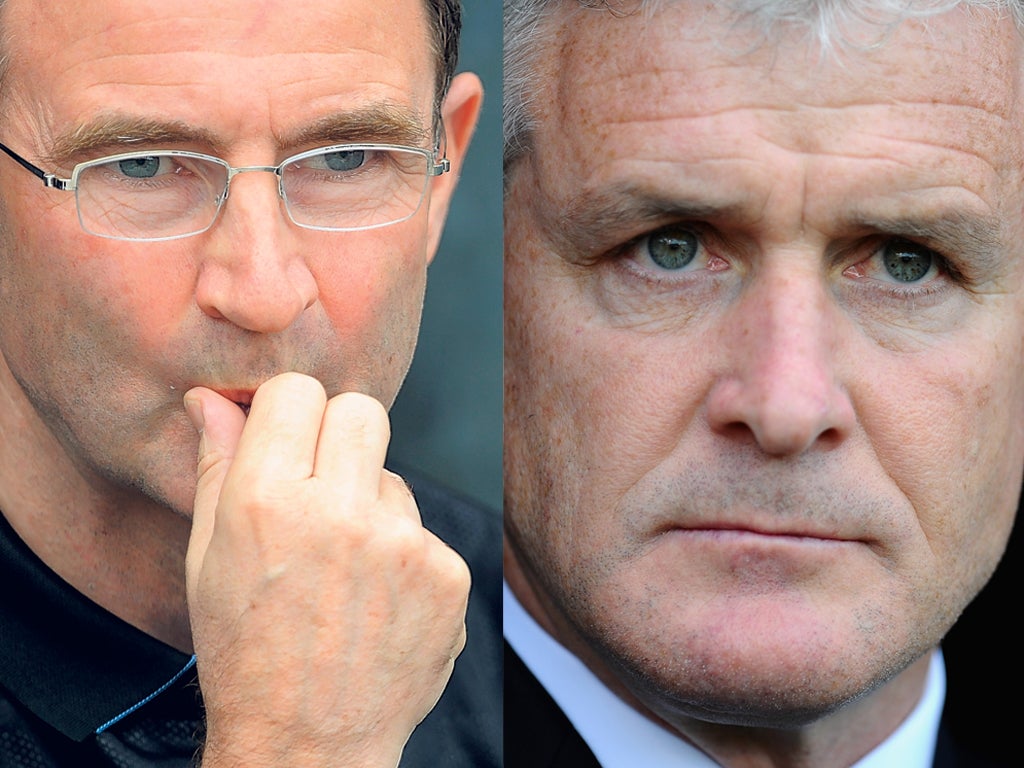In this tribal jungle, Bruce's scalp was a matter of time
The former Sunderland manager once told Simon Turnbull he was 'black-and-white daft'. Such devotion helped seal his fate

Your support helps us to tell the story
From reproductive rights to climate change to Big Tech, The Independent is on the ground when the story is developing. Whether it's investigating the financials of Elon Musk's pro-Trump PAC or producing our latest documentary, 'The A Word', which shines a light on the American women fighting for reproductive rights, we know how important it is to parse out the facts from the messaging.
At such a critical moment in US history, we need reporters on the ground. Your donation allows us to keep sending journalists to speak to both sides of the story.
The Independent is trusted by Americans across the entire political spectrum. And unlike many other quality news outlets, we choose not to lock Americans out of our reporting and analysis with paywalls. We believe quality journalism should be available to everyone, paid for by those who can afford it.
Your support makes all the difference.It was impossible not to feel sorry for Steve Bruce as he conducted what always seemed likely to be his valedictory post-match press conference as Sunderland manager last Saturday. Franco Di Santo's 93rd-minute winner for Wigan had turned the vitriol on him like a tap. "You fat Geordie bastard, get out of our club." The message clearly struck the solar plexus.
"It borders on abuse," Bruce told us. "I can't help where I was born." It was tempting to point out that Sunderland's soon to be outgoing manager was actually born in Corbridge in rural Northumberland, some 20 miles west of Newcastle. Technically speaking, that makes him a Northumbrian by birth rather than a Geordie. Given the seriousness of the situation – Sunderland's American owner and chairman Ellis Short having witnessed the club's supporters turn on the manager en masse for the first time – it was not the time for levity. Having been raised on Tyneside as a proud Geordie and Newcastle United fan, Bruce's Tyneside roots were always going to be flung in his face as a big black and white negative when it came to reckoning his time on Wearside.
He knew the score, and his background was well known on Wearside, although I always resisted digging up the quotes from an interview he was kind enough to give when he was about to face Kevin Keegan's newly promoted Newcastle side as a Manchester United player at Old Trafford in August 1993. "I was absolutely black-and-white daft," Bruce said at the time. "I idolised the Newcastle team managed by Joe Harvey in the early 1970s, especially Malcolm Macdonald and Tony Green. They were my heroes. I would have loved to have been a Geordie playing in the Newcastle side, like Peter Beardsley, Chris Waddle and Paul Gascoigne."
It was ironic while walking away from the Stadium of Light on Saturday, suspecting that Bruce's fate was sealed, to pass the bronze statue erected in honour of a Geordie (well, technically, another Northumbrian-born Geordie) who played in the Newcastle side that won the FA Cup in 1955. When Bob Stokoe took over as manager of Sunderland in November 1972, his black-and-white back story was not the kind of issue it would be today. In any case, it was all forgotten when he guided the Red and Whites to victory in the FA Cup final six months later. Sadly, these things have come to matter up here in the tribal football jungle of north-east England. I write this as someone who was born on Tyneside, a genuine Geordie, but who was brought up as a Sunderland fan (my parents are from the East Durham pit villages). Even now, when visiting St James' Park on reporting duty or as a member of the paying public, old school friends will tap me on the shoulder and shout, with intended good humour: "What are you doing here, you Mackem bastard?"
Steve Bruce might have been excused his Geordie roots a while longer on Wearside had Sunderland not been in such a state of obvious disarray since January – without a midfield of substance and with a powder-puff attack following the departure of Darren Bent, Danny Welbeck and Asamoah Gyan, and with the highly promising Connor Wickham on the injured list.
As it is, there is a vacancy for a new managerial kid down the road from the Toon. The most popular choice among Sunderland fans would be one of their own. Martin O'Neill was born and raised in Northern Ireland but confided on a visit to Wearside in his time as manager of Leicester: "I was a Sunderland fanatic as a kid because of Charlie Hurley." "King Charlie", as he is still known on Wearside, was a tough-as-teak, totemic Irish-born Sunderland centre-half and captain in the 1960s. He was voted the club's Player of the 20th Century. O'Neill used to follow Hurley's – and Sunderland's – fortunes, listening to a crackling transistor radio under the bed sheets while growing up in Kilrea.
That crackly red-and-white connection alone would count in O'Neill's favour if he were to take the manager's job at the Stadium of Light and the going ever threatened to get anything like as tough as it did for Steve Bruce.
Join our commenting forum
Join thought-provoking conversations, follow other Independent readers and see their replies
Comments